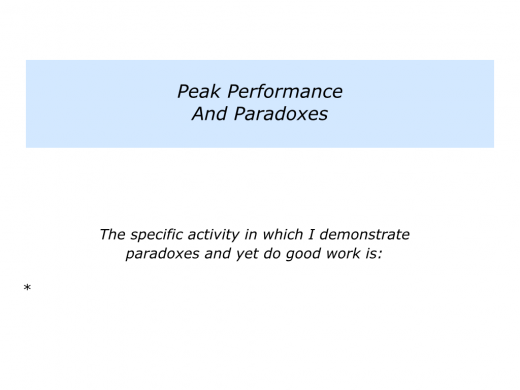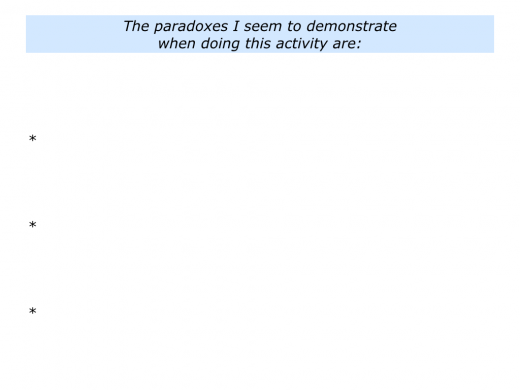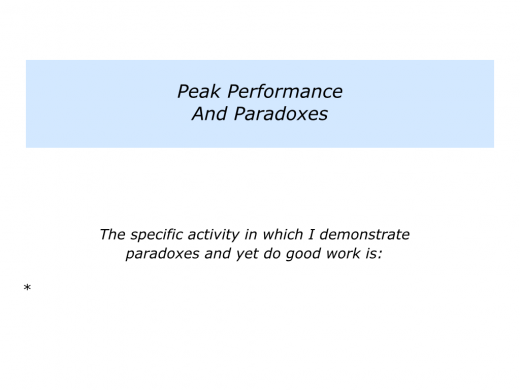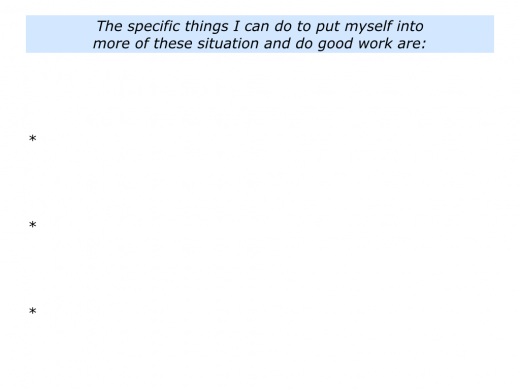“Are you are somebody who sees the big picture or do you pay attention to detail?”
This is the kind of question that was asked in old style job interviews. The applicant sometimes flummoxed the questioner by saying:
“Sometimes I do both.”
Peak performers defy old style psychometric tests. Why? They often balance contradictions in the areas where they excel. They are simultaneously intellectual and instinctive, focused and flexible, confident and humble.
Such people are also able to be both helicoptering and hands on. They are completely involved in the task, yet also hover above it to get perspective on what is happening.
Where do these things happen for you? You may embody some of these seeming opposites when pursuing a particular activity or tackling a specific kind of problem.
If you wish, try tackling the exercise on this theme. This invites you to do the following things.
Describe the specific activity in which you demonstrate paradoxes and yet also do good work.
Describe the paradoxes that you demonstrate when doing this activity.
Al Siebert found a similar pattern in his studies of life’s survivors. He recorded the qualities of such people in books such as The Survivor Personality and The Resiliency Advantage.
A paratrooper in the 1950s, Al remembered meeting the few remaining survivors from the 11th Airborne Division, a unit that had served in WWII and Korea.
Something about them made him sit up and take notice. They weren’t the gung-ho types. They had unusual qualities. He wrote:
“During our training I noticed that combat survivors have a type of personal radar always on scan. Anything that happens, or any noise draws a quick, brief look.
“They have a relaxed awareness. I began to realize it wasn’t just luck or fate that these were the few who came back alive. Something about them as people had tipped the scales in their favour.”
Al found that life’s survivors had the ability to choose their strategies from a wide repertoire of options. One contributing factor was that they embraced paradoxes.
They were able to see the big picture and the small details, to be alert and relaxed, to be serious and playful. This enabled them to see a wider number of options than people who had been trained to behave in one way.
Peak performers demonstrate several other paradoxical qualities when doing certain activities. They are able to make complicated things simple. They may also appear to do things slowly, but they accomplish these things more swiftly than other people. One person said:
“Everything seems to slow down. Others say that the situation seems chaotic, but I am able to get the heart of the matter and get the desired result.”
Let’s return to the specific activity in which you embody paradoxes and yet also do fine work. How can you build on this ability?
If you wish, try tackling the exercise on this theme. This invites you to do the following things.
Describe the specific situation in which you seem to embody paradoxes and yet do good work.
Describe the specific things you can do to put yourself into more of these situations and perform good work.
Describe the specific benefits of doing these things – both for yourself and other people.












Leave a Reply